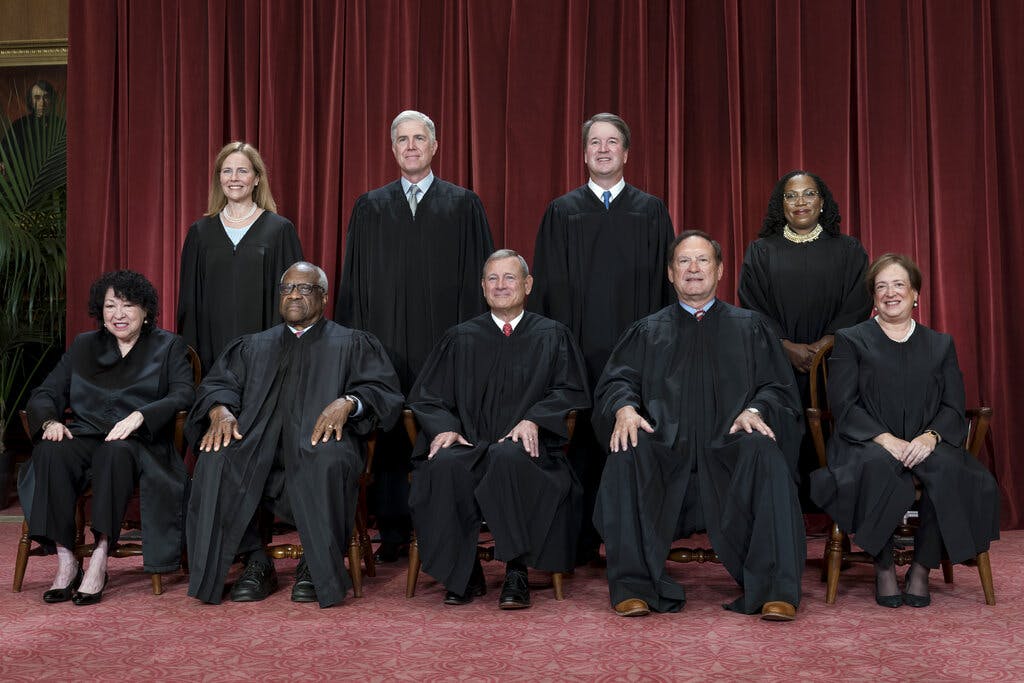Migrants in Texas Win From Supreme Court ‘Unprecedented and Legally Questionable Relief,’ Alito Says
‘We had no good reason to think that, under the circumstances, issuing an order at midnight was necessary or appropriate,’ the justice writes in a statement.

Justice Samuel Alito is fiercely criticizing his colleagues for their decision to block the potential deportation of migrants from the northern district of Texas, even though it is unclear if the government was even planning such a deportation operation. In a 7–2 vote on Saturday, the Supreme Court blocked the removal of detained migrants now being held in that one particular federal district.
“The Government is directed not to remove any member of the putative class of detainees from the United States until further order of this Court,” the court order states. Only Justice Alito and Justice Clarence Thomas dissented from that order.
Attorneys for the migrants detained in north Texas demanded relief from a federal district judge within 45 minutes of their filing. When that judge failed to immediately offer that relief, the attorneys went to the Supreme Court, which then blocked the possible deportation flights. Deputy assistant attorney general Drew Ensign told Judge James Boasberg at another hearing that while there were no flights scheduled for Saturday, the Department of Homeland Security could launch such an operation if they so chose.
Justice Alito says that the court’s decision to offer such relief to detained migrants is unprecedented. The way in which the potential flights were blocked also broke with past Supreme Court practice, he argues.
“Shortly after midnight yesterday, the Court hastily and prematurely granted unprecedented emergency relief,” the justice said in a statement accompanying the court order. The seven justices who voted to block potential deportation flights said that their relief would apply to all members of the “putative class” of migrants now in detention, though they did not offer a specific list of individuals now protected by their order.
“Although the order does not define the ‘putative class,’ it appears that the Court means all members of the class that the habeas petitioners sought to have certified, namely, ‘[a]ll noncitizens in custody in the Northern District of Texas who were, are, or will be subject to the March 2025 Presidential Proclamation” invoking the Alien Enemies Act, Justice Alito says.
He further took issue with the fact that his colleagues would even take on this case as it had not yet gone through the appellate process. Justice Alito says the court and attorneys involved may have violated the Federal Rules of Appellate Procedure by granting relief when the district court had not even weighed in on the case.
“When the applicants requested such relief in the District Court, they insisted on a ruling within 45 minutes on Good Friday afternoon, and when the District Court did not act within 133 minutes, they filed a notice of appeal, which the District Court held deprived it of jurisdiction,” Justice Alito writes.
When the appeal reached the Supreme Court on Friday, the justices made their decision based only upon evidence and arguments submitted by attorneys for the migrants — not from the government. Justice Alito says his colleagues made a decision to grant relief to the detainees based on allegations made with “little concrete support.”
“We had no good reason to think that, under the circumstances, issuing an order at midnight was necessary or appropriate,” he said of the late-night court order to block potential deportations, which was released by the court shortly after midnight on Saturday.
While dissenting from his colleagues for their decision to block any potential deportations from the northern district of Texas, Justice Alito also had a stark warning for President Trump. He urged the White House to stick by a previous Supreme Court order that requires the government to give notice to migrants facing deportation so that they can file habeas complaints in the federal districts where they face deportation orders.
“Both the Executive and the Judiciary have an obligation to follow the law. The Executive must proceed under the terms of our order in Trump v. J. G. G. … and this Court should follow established procedures,” the justice says.

